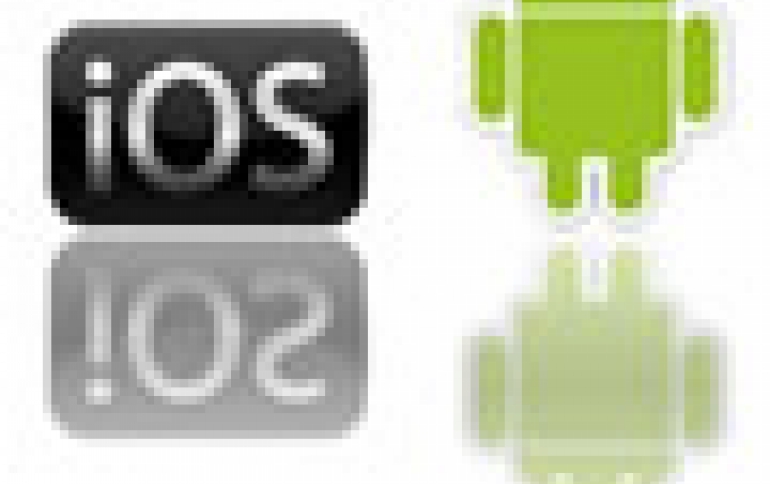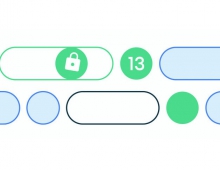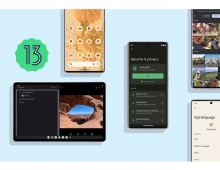
Android and iOS Squeeze the Competition In the Smartphone Operating System Market
Android and iOS inched closer to total domination of the worldwide smartphone market in both the fourth quarter (4Q14) and the calendar year 2014 (CY14). According to data from the International Data Corporation (IDC), Android and iOS accounted for 96.3% of all smartphone shipments, up slightly from 95.6% in 4Q13 and from 93.8% in CY13. In terms of year-over-year shipment growth, Android outpaced the overall smartphone market for CY14 (32.0% vs 27.7%, respectively) while iOS beat the market in 4Q14 (46.1% vs 29.2%, respectively).
Android pushed past the one billion unit mark in 2014, a significant milestone by itself but also because total Android volumes in 2014 bested total smartphone volumes in 2013. Samsung retained the leadership position by a wide margin, shipping more volume than the next five vendors combined, IDC's data showed. At the same time, Samsung's total volumes for the year remained essentially flat while Asian vendors including Huawei, Lenovo (including Motorola), LG Electronics, Xiaomi, and ZTE fueled the most growth for Google's platform.
iOS saw its market share for 2014 decline slightly even as volumes reached a new record and grew at nearly the same pace as the overall smartphone market. Much of this was due to the strong demand for Apple's new and larger iPhones and the reception they had within key markets. What remains to be seen is how Apple will sustain demand going forward, as larger screens were among the last gaps in its product portfolio.
Top Four Smartphone Operating Systems, Unit Shipments, Market Share, and Year-Over-Year Growth, Calendar Year 2014 Data (Units in Millions) |
||||||||
| Operating System | 2014 Unit |
2014 Market |
2013 Unit |
2013 Market |
Year-Over- |
|||
| Android | 1,059.3 | 81.5 | % | 802.2 | 78.7 | % | 32.0 | % |
| iOS | 192.7 | 14.8 | % | 153.4 | 15.1 | % | 25.6 | % |
| Windows Phone | 34.9 | 2.7 | % | 33.5 | 3.3 | % | 4.2 | % |
| BlackBerry | 5.8 | 0.4 | % | 19.2 | 1.9 | % | -69.8 | % |
| Others | 7.7 | 0.6 | % | 2.3 | 0.2 | % | 234.8 | % |
| Total | 1,300.4 | 100.0 | % | 1,018.7 | 100.0 | % | 27.7 | % |
Source: IDC Worldwide Quarterly Mobile Phone Tracker, February 24, 2015 |
||||||||
Windows Phone had the smallest year-over-year increase among the leading operating systems growing just 4.2%, well below the overall market. Having finalized its acquisition of Nokia in the spring of 2014, Microsoft relied primarily on a long list of entry-level Lumia devices to maintain its position in the market, and relied on its partners HTC and Samsung to provide cover on the high-end of the market. With the launch of Windows 10 later this year, Windows Phone stands to make a more concerted effort to return to the high end of the market.
Top Four Smartphone Operating Systems, Unit Shipments, Market Share and Year-Over-Year Growth, Q4 2014 (Units in Millions) |
||||||||
| Operating System | 4Q14 Unit |
4Q14 Market |
4Q13 Unit |
4Q13 Market |
Year-Over- |
|||
| Android | 289.1 | 76.6 | % | 228.4 | 78.2 | % | 26.6 | % |
| iOS | 74.5 | 19.7 | % | 51 | 17.5 | % | 46.1 | % |
| Windows Phone | 10.7 | 2.8 | % | 8.8 | 3.0 | % | 21.6 | % |
| BlackBerry | 1.4 | 0.4 | % | 1.7 | 0.6 | % | -17.6 | % |
| Others | 1.8 | 0.5 | % | 2.3 | 0.8 | % | -21.7 | % |
| Total | 377.5 | 100.0 | % | 292.2 | 100.0 | % | 29.2 | % |
Source: IDC Worldwide Quarterly Mobile Phone Tracker, February 24, 2015 |
||||||||
BlackBerry posted the only year-over-year decline among the leading operating systems, falling -69.8% from 2013 levels. 2014 marked a year of rationalization for the beleaguered platform, and by the end of the year the company had revealed multiple enhancements to its platform and new device additions with the BlackBerry Passport and BlackBerry Classic. CEO John Chen anticipates 10 million units will be shipped in 2015, returning the company to profitability and marking a 72% increase over the 5.8 million units shipped in 2014.





















